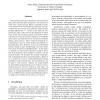17 search results - page 1 / 4 » How Resilient are Distributed f Fault Intrusion-Tolerant Sys... |
DSN
2005
IEEE
13 years 10 months ago
2005
IEEE
Fault-tolerant protocols, asynchronous and synchronous alike, make stationary fault assumptions: only a fraction f of the total n nodes may fail. Whilst a synchronous protocol is ...
TPDS
2010
12 years 11 months ago
2010
In the past, some research has been done on how to use proactive recovery to build intrusion-tolerant replicated systems that are resilient to any number of faults, as long as reco...
SAC
2006
ACM
13 years 10 months ago
2006
ACM
In a recent work, we have shown that it is not possible to dependably build any type of distributed f fault or intrusiontolerant system under the asynchronous model. This result f...
WORDS
2003
IEEE
13 years 9 months ago
2003
IEEE
Assigning an application’s fault-tolerance properties (e.g., replication style, checkpointing frequency) statically, and in an arbitrary manner, can lead to the application not ...
SSS
2005
Springer
13 years 10 months ago
2005
Springer
Awareness of the need for robustness in distributed systems increases as distributed systems become integral parts of day-to-day systems. Self-stabilizing while tolerating ongoing ...

